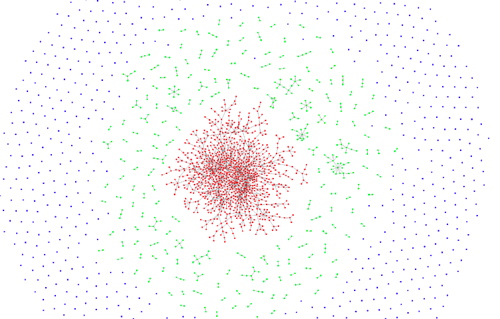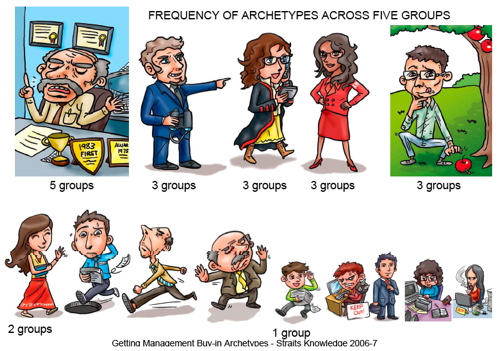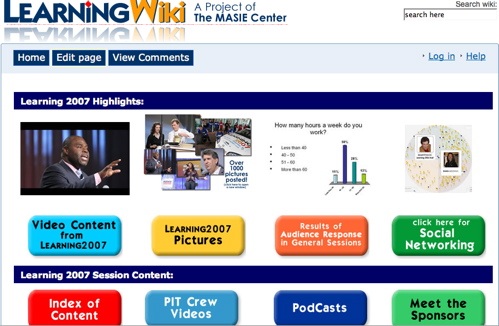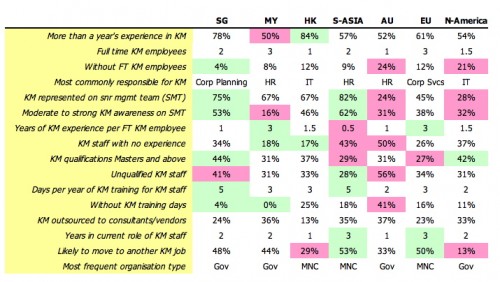Jan 03
Participation, Interaction and Value in Communities
A wonderful illustration and commentary from Valdis Krebs on the dynamics of participation, interaction and value for members in online communities, using a simple social network analysis technique. Thanks to Bill Ives for this too!

Jan 03
Web 2.0: Deja Vu
Thanks to Bill Ives for alerting me to this hilarious video.
Jan 02
The Life of a Knowledge Manager: Nasty, Brutish and Short
Last October we ran a global survey through iKMS to find out how much organisations invest in their KM initiatives – in terms of the senior management attention and support they get, whether they invest in building the qualifications and experience of their KM staff, and whether they consciously protect the KM experience they are building by providing career paths for their knowledge managers. The results overall are extremely depressing, and the “new kids” on the block in Asia apparently do far better than the supposedly more mature environments of North America, Europe and even Australasia. Here’s a table summarising the key findings (click on the image for a larger version). Green boxes indicate the better performers and pink boxes indicate the worse performers.
The full results can be downloaded here. And here’s a video presentation from iKMS’s KM Singapore conference, where I presented the findings for Singapore compared with the rest of the world.
The MPEG4 video file can be downloaded here. [NOTE TO PC USERS: the filename appears to be too long for PC-version of Quicktime to handle. Just abbreviate the filename once you’ve downloaded it, and it will play just fine].
My thanks to the members of various KM communities and contributors, including iKMS, HKKMS, HKPolyU, actKM, SIKM Leaders Forum, KM Malaysia, KMTalk, KM Forum, the Gurteen Knowledge Community, as well as readers of this blog, for participating in this exercise.
Jan 02
Classic Studies in Irrational Behaviour
Jeremy Dean over at PsyBlog has collected a wonderful series of 10 posts on “Why We do Dumb or Irrational Things” with lucid summaries of ten classic social psychology experiments (including Milgram, Festinger and Sharif) and links to the original research. For those of us who often plan as though human social groups think and behave logically, a salutary reminder. Thanks to Dale Arsenault for alerting me to this.

Dec 29
Maps Are Not Enough
From Graham Durant-Law this pithy reminder that a social network map alone is not enough. Graham probes the “Tertius” family history to show that boundary spanners can be both selfish and altruistic, and you’ll need to investigate beyond the map to find out which they are. Rob Cross makes the same point – a bit less pithily – in his excellent book with Andrew Parker, The Hidden Power of Social Networks. I’d like to make the same point behind any KM metrics in general… the numbers and the trends are essentially ambiguous. They simply alert you to something that’s going on, and prompt you to go look deeper. And what’s going on is essentially a story that people close to that context should be able to tell you. Wot, just talk to people, no scientific evidence? Sadly, yes. For more on metrics, see this recent white paper.

Dec 12
Oh Well, Time to Change Trade
You can now buy Knowledge Management in a box for US$249. Would somebody please buy it and let me know whether we should pack up and start doing something else? Thanks to Bruce Richard via the SIKM Leader’s Forum for this little gem.

Dec 11
Getting Management Buy-in For KM
About 18 months ago we launched a narrative project to collect stories from KM practitioners about their experiences of success and failure in getting management buy-in and support for their KM initiatives. We collected 84 stories, which we took to a series of conferences in Australia, Hong Kong and Singapore at the end of 2006, to derive archetypal characters that represent the range of typical attitudes and behaviours that knowledge managers encounter.

After clustering related characters we ended up with fourteen archetypes, which we tested at this year’s actKM conference in Canberra. The final product, formatted for use in a communications workshop similar to the one we conducted in Canberra, is presented here, together with all the stories collected. Many thanks to all the KM practitioners who participated, both online and in person, to this open narrative project.
Dec 10
Team Knowledge: A Conversation with Gary Klein
Last week, Gary Klein and his colleague from Klein Associates Cynthia Dominguez stopped by our office for a chat around the topic of team knowledge – what makes teams smart at being a good team? What helps them avoid mistakes? What competencies do people need to bring to teams, and how does the culture of a team affect its ability to leverage expertise and knowledge? How do rituals and context and attitude combine for effective action? What role does narrative play in team learning and sensemaking?
We made a video of the conversation, courtesy of my MacBook camera, a Sanyo Xacti mp4 camcorder, and my trusty iPod+microphone for the sound (which clicks and whirs a bit). It’s in two segments, each of 20-25 minutes in duration.
Dec 10
Experience as a Prospect
Buried away at the foot of Maish Nichani’s post on Karim Rashid the other day, is this tantalising snippet:
“While many of us treat experience as a historical after thought, Karim, I think, likes to treat experience as something he’d like to pass through in the future.”
Now that’s an interesting angle. It captures perfectly the curiosity, focus, purposefulness and urge to develop of people who are good at learning, at purposeful soaking up of experience.
Dec 07
It Ain’t Over Till the Fat Wiki Sings
Here’s a nice way (from Elliot Masie’s Learning 2007 conference) of extending the life (and discussions) of a conference past its formal close. Sessions are posted in video and podcast form (would be great if they’d post the slidesets too), there are poll results, a link to a delegates’ social networking site, photos, and commenting ability. From the videos it looks like they’d also designed the conference to be human and learning friendly too, despite its scale (over 2,000 delegates). Visit the Learningwiki today.



